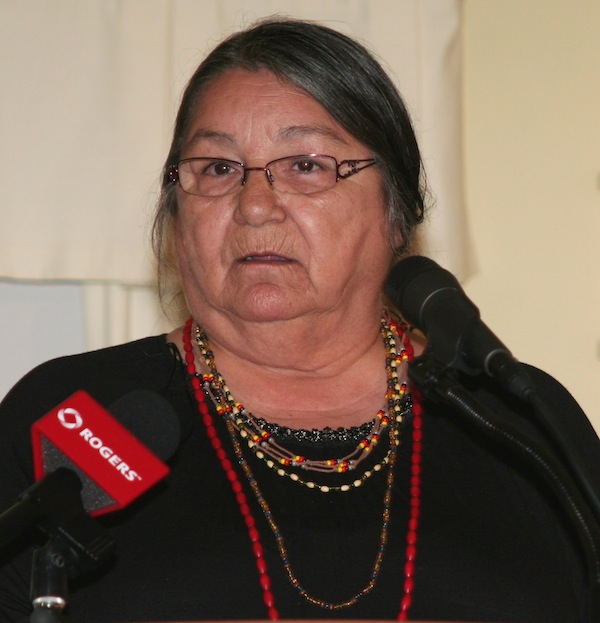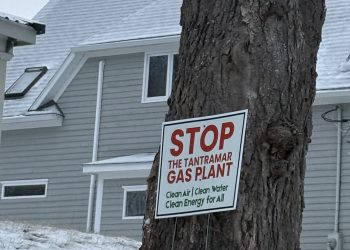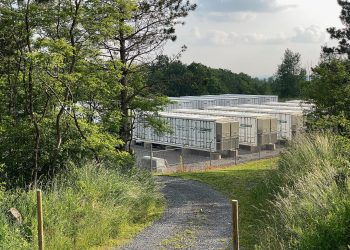Saint John – Renewable energy will ensure human and environmental health that is currently jeopardized by fracking for gas and transporting western crude oil here through a proposed west-east pipeline, according to a best-selling author, a Maliseet elder and a Halifax-based energy activist, speaking at a summit on energy in Saint John on Oct. 2.
The proposed Energy East pipeline poses “an enormous threat” to the environment, said Maude Barlow, national chairperson of the Council of Canadians, a citizens’ advocacy organization. “There is no such thing as a pipeline that won’t spill,” added the internationally known activist and author of books on topics such as solutions to the global water crisis.

As “big oil” and government plan major expansion of the Alberta tar sands, Atlantic Canadians need to ask why they should take the risk in this region, she said. Producing harmful greenhouse gasses, the tar sands also use and destroy millions of barrels of water daily, added the former senior adviser on water to the president of the United Nations General Assembly.
The panel launched “Energy for Everyone” — three days of free public events held to grow a movement opposed to fracking and the pipeline proposed by TransCanada Corporation to reach the port city of Saint John. Also on the panel were Alma Brooks, an elder with the Maliseet St. Mary’s First Nation near Fredericton and Catherine Abreu, regional coordinator of the Atlantic Canada Sustainable Energy Coalition.
The Halifax-based coalition co-sponsored “Energy for Everyone” with the Council of Canadians, Common Causes Saint John and CCNB Action, advocacy arm of the Conservation Council of New Brunswick. The alternative summit was organized to coincide with the Atlantic Canada Energy Summit held Oct. 3-4 in Saint John.
Drawing energy industry officials and politicians from the New Brunswick and federal governments, the Energy Summit expressed strong support for the Energy East pipeline. At the same time, the provincial government is facing widespread opposition from some Aboriginal groups and others concerned about its support for shale gas exploration and fracking.

In Saint John, Irving Oil owns and operates Canada’s largest oil refinery. This summer Irving Oil announced a joint venture with TransCanada to construct a new deep-water marine terminal in the Bay of Fundy to help facilitate the proposed Energy East pipeline.
However, Barlow said further investment in fossil fuels will “send good money after bad,” impeding needed investment in a sustainable energy future. Promises by industry and government for a boom in jobs and the economy from an west-east pipeline create myths in need of debunking, she added.
She also questioned promises of lower oil prices for Atlantic Canadians resulting from the pipeline. The goal is actually to export tar sands oil to fetch world oil prices, she said. Atlantic Canada’s strong capacities for wind, solar and tidal energy could instead create a more prosperous economic and sustainable energy future, said Barlow.
Alma Brooks said fracking and the proposed pipeline threaten her people’s land, water and way of life, violating their ancestral ethic to “take only what you need in order to live.”
Referring to major oil and gas proponents, she said, “We must fight them in the courts” and on “the international level.” Most fossil fuels need to be left in the ground to control climate change and sustain life, she added.
Catherine Abreu said Atlantic Canada could be a global leader in the move away from fossil fuels to alternative energy. Pointing to many alternative initiatives already operating in the region, she urged creation of “an Atlantic power pool” to balance supply and encourage development of renewable energy.
Such a cooperative venture has the potential “to stimulate the economy and create far more jobs” than the proposed pipeline, she added.
Energy for Everyone included workshops and presentations Oct. 3-4 which also highlighted alternatives to nuclear energy. Atlantic Canada’s only nuclear power plant is located near Point Lepreau, about 50 km west of Saint John.
The parallel summit included a peaceful march through the streets and rally Oct. 3 outside the Delta Brunswick Hotel where the Atlantic Canada Energy Summit was underway.
In 2011, Canadian interfaith leaders called for a national renewable energy policy in their “Call for Leadership and Action on Climate Change.” In 2009, Bishop Luc Bouchard, then of St. Paul, AB, issued a pastoral letter raising moral questions about tar sands development in that diocese. In “The Integrity of Creation and the Athabasca Oil Sands,” the Catholic bishop said the integrity of creation there “is clearly being sacrificed for economic gain.”
Roma De Robertis, SCIC, lives in Saint John, NB.







![Migrant workers’ labour conditions not on the table at Canada–U.S. lobster industry conference [video]](https://nbmediacoop.org/wp-content/uploads/2026/01/LobsterJan222026-5-120x86.jpg)


